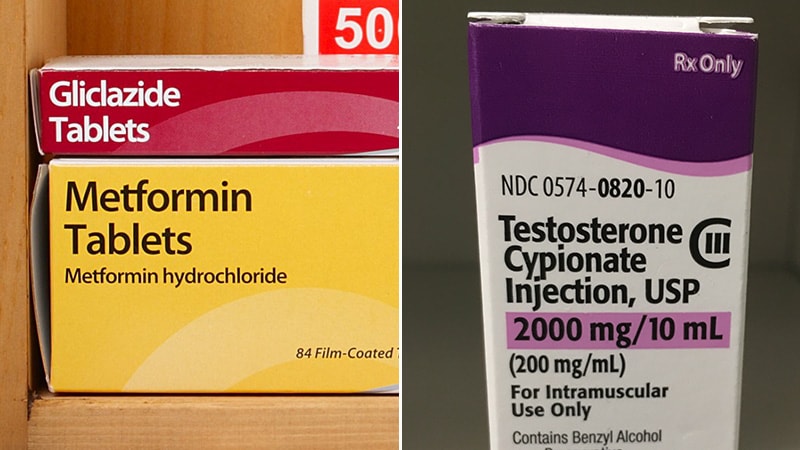The use of metformin and testosterone replacement therapy, either individually or in combination, is associated with significant reductions in the incidence of prostate and colorectal cancer in men across race and ethnic backgrounds, with the reductions most prominent with the combination of the two treatments.
“To our knowledge, no study has investigated the combination of testosterone replacement therapy plus metformin in relation to incident hormone-associated cancers, stage, and grade at diagnosis, and hormone-associated cancers’ specific mortality,” report the authors in research, recently published in Clinical Endocrinology.
“In this large [racially] diverse SEER‐Medicare claims‐based analysis, we found that prediagnostic use of testosterone replacement therapy or metformin, independent or in combination, was inversely associated with incident prostate and colorectal cancers and [combined] hormone associated cancers,” they say.
With an increasing prevalence of testosterone deficiency and diabetes in older men, metformin and testosterone replacement therapy are increasingly used in combination.
Metformin has been previously linked with a reduction in overall cancer risk; however, the effects of the drug combined with testosterone therapy on the risk of hormone-related cancers, are unclear.
Noting that “previous studies have suggested a biological interaction between low levels of testosterone and type 2 diabetes and subsequently between testosterone replacement therapy and metformin,” the authors investigated their role in cancers that have been associated with endogenous testosterone.
Prostate, Colorectal Cancer Risk Reduce
For the study, first author David S. Lopez, DrPH, an associate professor of epidemiology at The University of Texas Medical Branch (UTMB) in Galveston, and colleagues identified 143,035 men aged 65 and older in the Surveillance, Epidemiology, and End Results (SEER) Medicare 2007-2015 database who had been diagnosed with incident prostate, colorectal, or male breast cancer.
Among the men, 110,430 were identified as White, 13,520 as Black, and 19,085 as another race, including Asian, Hispanic, or Native American. Their mean age was 75 years, and median time from cancer diagnosis to death or study end was 5.5 years.
Prediagnosis prescription data showed that about 18% of the men had been treated with metformin alone, 1.5% with testosterone alone, and 0.5% with testosterone and metformin.
The analysis showed that metformin and testosterone replacement therapy were independently and jointly associated with a reduced incidence of prostate cancer, with the greatest reduction with the combination of the two (joint odds ratio [OR], 0.44).
The two drugs were also inversely associated with a high grade at prostate cancer diagnosis (joint OR, 0.36) and advanced cancer stage (joint OR, 0.47), after multivariate adjustment for factors including age, race/ethnicity, hypogonadism, hypertension, diabetes, insulin use, muscular wasting, and other factors.
Metformin and testosterone replacement therapy were also independently and in combination inversely associated with the incidence of colorectal cancers (joint OR, 0.47); however, the associations with higher grade and advanced stage were not consistent, the authors note.
No similar associations were observed in relation to male breast cancer.
The use of metformin and testosterone therapy were, however, also associated with significant reductions in the incidence of the combined cancers (joint OR, 0.45), including high-grade (OR, 0.38) and advanced stage (OR, 0.49), after multivariate adjustment.
The authors note that the results regarding stage and grade at diagnosis of the combined cancers were limited in sample size for Black and other races, and therefore “should be interpreted with caution.”
“Among White men, the direction of these associations remained similar like in the overall population, but among Black and Other Race men the independent and joint effects were observed mainly on the risk of [the cancers combined],” they report.
There were no significant associations between metformin and testosterone replacement therapy use and mortality with any of the cancers assessed.
“Overall, we found independent and inverse associations between prediagnostic use of metformin and testosterone replacement therapy with incident prostate and colorectal cancers [mainly incident disease] and [the cancers combined] in older men, including stage and grade at diagnosis,” the authors conclude.
They note that “larger studies are needed to confirm the independent and joint association of metformin plus testosterone therapy with these cancers in understudied and underserved populations.”
The authors have reported no relevant financial relationships.
Clin Endocrinol. Published July 28, 2022. Abstract
Follow Medscape on Facebook, Twitter, Instagram, and YouTube.
Source: Read Full Article
